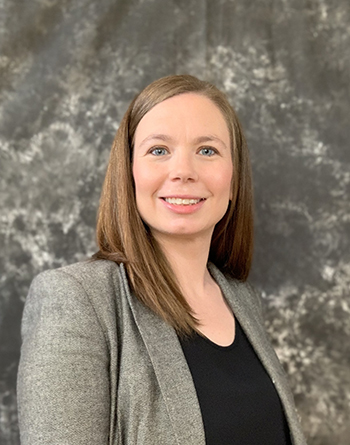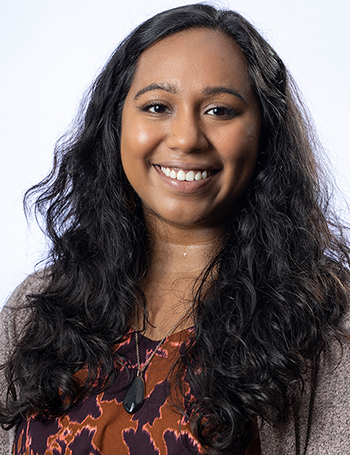Published on
Updated on

Erin Bullett, Assistant Clinical Professor, Department of Psychological Sciences; Associate Director of MU Psychological Services Clinic
Erin Bullett has worked at the MU Psychological Services Clinic (PSC) for 3.5 years as a licensed psychologist and assistant clinical professor and has been the director of the clinic since January 2022.
The PSC serves the community as well as the MU campus. They offer behavioral assessment and psychological testing and provide treatment services for children and adults, including group, couples, family, and individual therapy. They will often take referrals from the MU Counseling Center after treatment is completed there.
Doctoral students in clinical psychology, as well as some clinical faculty members, provide year-round services at the clinic. Their services tend to be short-term treatments, typically with 10 sessions or fewer. They do not provide crisis services, but will help individuals figure out where they need to go. They use grants and fee assistance to cover services of their doctoral students.
In Bullett’s view, the biggest barriers to seek mental health treatment are the stigmas and access to resources. However, COVID-19 has made mental health services more flexible in many ways, such as having telehealth options.
“When students and others are seeking mental health support, they are often in need of supports quickly,” she explains, “Our current mental health system is not equipped to serve those needs as clinician/human resources are finite.”
Fortunately, students have the MU Counseling Center’s new Rapid Access Team as well as 24/7 phone consultations (see below), so they can get help or referrals in a crisis situation.
She would also like there to be more preventative mental health programs, rather than when they are needed.
“I would love for everyone on campus to receive mindfulness skills training as part of their fall welcome/welcome back/freshman orientation,” Bullett says.
The Wellness Resource Center, located in the Student Center, has preventative programs, such as Well-Being Coaching on sleep, stress management, and a Canvas course available to all students. Peer education outreach is also available for student groups on topics such as mindfulness and meditation.

Remya Perinchery, Licensed Psychologist – MU Counseling Center
All members of the MU community can help support student success by knowing what wellness resources are available and how and when to refer students to the appropriate services. Sometimes, students are hesitant to seek help or have difficulty finding it, and faculty or advisors might be the first to hear about difficulties that a student is experiencing. Fortunately, there are many supports on campus to help address these challenges at the early stages, before they become a crisis situation.
“In our experience, several barriers that make it difficult for students to seek help are access, stigma, and trust,” said Remya Perinchery, a licensed psychologist at the MU Counseling Center.
Previously, students might have to wait up to four weeks to get an appointment. To help with the access portion of care, the MU Counseling Center now has an expanded Rapid Access team of clinicians who conduct 20-minute screenings with students to find the best care for their needs. This has been successful in speeding up the treatment process, and students can get their first appointment within 72 hours. If a referral is needed for other campus or community services, they also can assist with that.
In addition, the Counseling Center is now located on the 4th floor of Strickland Hall, right across from the Student Center, so it is easier for students to stop by on the way to class to make an appointment for their quick screening. There is no charge for students to visit the Counseling Center.
What would be her advice for faculty and staff who want to help students?
“I would encourage them to have [our webpage with mental health resources] available and bookmarked so they can show students a good first place to start,” Perinchery said. “Student Health and Wellbeing has compiled all the mental health resources available on campus.”
Also important for the Mizzou community to know is that the Counseling Center has 24/7 consultation services available for individuals to consult about a student they are concerned about. Anyone can call 882-6601 Monday – Friday, from 8:00 a.m.-5:00 p.m. and ask to speak to the on-call counselor. After hours, including nights and weekend, you can call the same number and listen to the instructions on voicemail to reach a clinician.
“It’s also helpful for faculty to know what will happen when they call the Counseling Center,” says Perinchery. “When a student calls, they will be asked if they want to schedule an appointment, need to speak to a counselor immediately, or are here for another reason. From there, if a student is in distress or needing immediate support, they can ask for that, or they can schedule a Brief Screening appointment within 72 hours of calling, most often same or next day.”
What are some reasons why students have a hard time seeking out resources?
“Despite the fact that mental health is more openly discussed, it can still be incredibly difficult to seek out services, especially if you hold marginalized identities at a predominantly white institution,” she says. The Counseling Center works to “reduce that stigma and start conversations across campus for students with marginalized identities.”
As part of these efforts, they create workshops, social events, and resources on mental health and wellness including stress and self-care topics.
Obviously, COVID-19 affected both the need and access to student mental health resources. The MU Counseling Center offers telehealth services for students as another option. Many students experienced social anxiety and academic stress returning to the university after remote learning, and attending individual or group therapy can help them stay in school.
The MU Counseling Center is also making new efforts to conduct more outreach to meet with students outside of their offices. Perinchery adds,
“The Counseling Center director Christine Even has made significant efforts to meet with campus faculty and staff to make sure they are informed about Counseling Center updates and how students can advocate for themselves.”
The Office of the Vice Chancellor for Student Affairs has a guide to assisting students in distress for faculty and staff called See.Say.Do.Something. It contains indicators of distress, response options, contact phone numbers and tips on being proactive. To request copies, call 573-882-0157.
Another resource for all students, faculty and staff is a new free wellness app called TAO. The app has an online toolkit with resources available anytime. To register for TAO, navigate to us.taoconnect.org/register using your Mizzou email address.